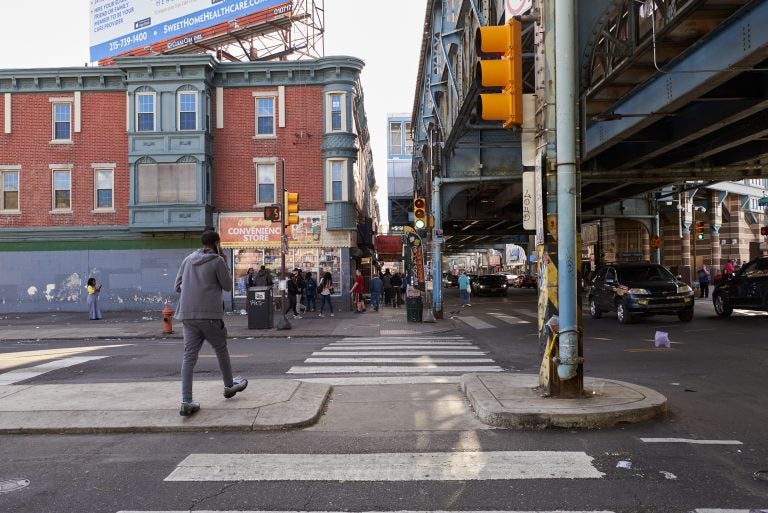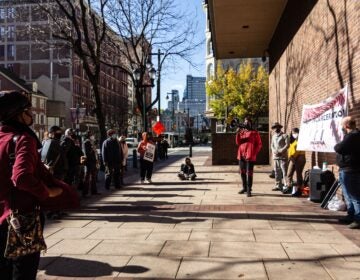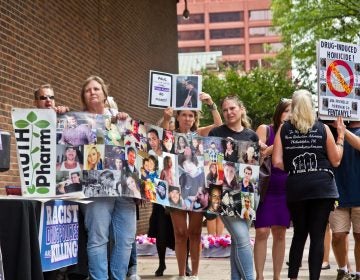No one asks Kensington’s children if injection site would be ‘safe’
The legality of a supervised injection site isn’t the only thing at stake. This is about far more than the law.

Outside Allegheny Station in the Kensington section of Philadelphia. (Natalie Piserchio for NPR)
Tuesday was the first day of school in Philadelphia, but in Kensington, students could soon face a brand-new reality.
Kensington is a neighborhood that’s been overrun by drugs, overlooked by the city, and overburdened by poverty. It’s a neighborhood where dealers shoot rivals and people use drugs and death is at both ends of the spectrum.
As part of a city strategy to stop drug overdoses, a nonprofit has proposed putting a safe injection site in that neighborhood with the city’s blessing. The Justice Department has sued to stop the site, saying it violates federal law. And on Thursday, U.S. District Judge Gerald Austin McHugh will hear oral arguments in United States v. Safehouse. Soon after, he will decide whether it’s legal to open Safehouse — a facility in which people would be able to use illegal drugs under medical supervision.
I wish the legality of such a site was the only thing at stake. Unfortunately, this is about far more than the law.
In deciding this case, McHugh will determine whether it’s right to let people who don’t live in a community control its fate. He’ll decide whether it’s ethical to allow addiction to swallow a neighborhood whole. He’ll decide whether it’s moral to tell parents that strangers should control what happens with their children.
Over many visits and conversations, I’ve learned that the vast majority of community residents are opposed to the site, as indicated by thousands of petition signatures and loud disapproval at community meetings.
However, advocates who favor the site claim that 90% of community members support a safe injection site, based on a survey conducted by researchers from Drexel University’s Dornsife School of Public Health.
Community residents have long questioned the survey’s results. Not only because lead author Alexis Roth served on Mayor Jim Kenney’s Opioid Task Force — the same group that recommended that the city explore opening a safe injection site. Community members have also said the survey results were skewed by the inclusion of homeless drug users whom researchers counted as neighborhood residents.
Unfortunately, there is a group of neighborhood residents that was not included in the surveys of the advocates or the petitions of the opponents. That group is the children. And since they’re the ones who’ve borne the brunt of their community’s heroin crisis, they’re the ones whose voices should matter the most.
The children of Kensington and neighboring Harrowgate must walk to school through mounds of dirty needles. The children must try to grow up between the drug dealers’ gunshots. The children must survive in a place where the addicted seem to matter more than they do.
Children shouldn’t have to experience that kind of trauma. But when parents in Kensington and Harrowgate raise that point and others, they’re ignored.
I’ve listened to people who don’t live there yell at the residents who oppose the site. I’ve seen public officials tell those who raise questions, “You’ve had heroin here for 50 years.”
And as I’ve watched some city officials show more concern for the addicted than they’ve shown for taxpayers and their children, I’ve come to understand how very wrong this is.
Now it’s up to a judge to decide what happens next. Will he uphold the federal law that prohibits the operation of a facility where people use illegal drugs? Or will he side with those who claim their stated mission of stopping overdoses should be enough to make them exempt from that law?
I guess we’ll see. But in the meantime, I keep thinking about those children. What will they learn from seeing heroin normalized? What will they see when the drug dealers fight to control lucrative territory? What will they learn while stumbling over needles on their way to school?
I shudder to think what those lessons will create. That’s why I hope the judge will uphold federal law and declare that a safe injection site is illegal. Because the only safe site that should exist on Philly’s streets is a safe site for kids to grow up.
—
You can hear Solomon Jones weekdays from 7 a.m. to 10 a.m. on WURD Radio 900 AM/96.1 FM
WHYY is your source for fact-based, in-depth journalism and information. As a nonprofit organization, we rely on financial support from readers like you. Please give today.





